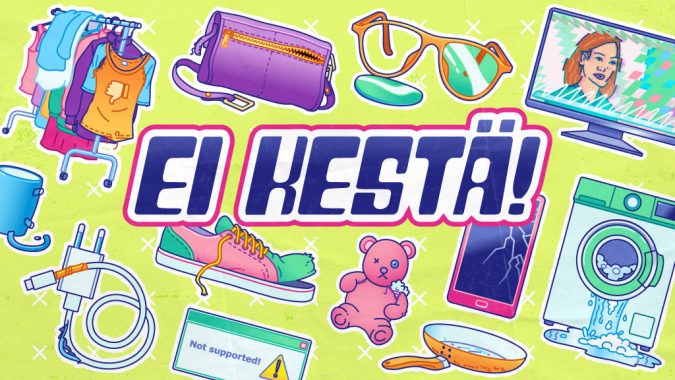Ei kestä! -Campaign

The world keeps consuming more and more. If everyone consumed like people in Finland do, we would need more than three planets worth of resources. It is estimated that the consumption of all the people of the world will rise to the same level as the Finns by 2050. This scenario must be stopped – and the Finns need to decrease their own consumption.
Overconsumption means that we consume over the planets natural limits. Over-consumption is created, among other things, by the fact that the goods produced are of poor quality. Goods and textiles are no longer made to last, but to maximize profits for companies and investors. The life cycle of modern products is very short. This can be seen, for example, in very poor quality but cheap clothes. In electronic products, the aim is to make a profit, for example, by making them difficult to repair or by discontinuing software upgrades for older models. Thus, the consumer is sometimes forced to adapt to the rapid pace of production. In addition, cultural factors, such as fashion and ever-changing trends, increase our desire to consume and replace functional and intact clothing and products with new ones.
Overconsumption exacerbates various problems related to the environment and global living conditions, such as biodiversity loss, loss of carbon sinks, acidification of water bodies, air quality pollution, and soil damage due to mining and fertilizers. As a result, overconsumption also has global social impacts on working conditions and incomes, access to education, food security and health, clean water, energy, peace and human rights, and equality.
The circular economy is one solution to the problem of overconsumption. In a circular economy, existing materials are used several times and existing products are repaired for use as long as possible. In addition, there is a shift from buying new products to borrowing and renting products and services. This also requires a cultural change, meaning that the people need to learn to buy less and be more selectively when doing so. Such major changes will not only be achieved by changing the consumption behavior of individuals, but will require structural and regulatory changes. Changemaker’s Ei kestä! -campaign’s appeal seeks to take steps towards a circular economy in six areas that require structural change.
In our campaign, we have chosen the clothing and electronics industry as the campaign heads because they generate a many of the problems related to overconsumptions. For example, clothes today are very often made of low-quality materials, while the consumption of electronic products is increased, for example, by constant updating. It is also possible to make products more durable to start with, and make then repairable, and many companies already do so. As sustainable production and reparability are voluntary for companies, regulation at the state level is needed. In addition to this, people’s consumption habits also have a lot of impact. We need to learn to use things longer and build a culture where we don’t demand new clothes and electronics from ourselves or each other every season.
Sign petition to curb overconsumption
Ei kestä! -campaign’s appeal to curb over-consumption is addressed to Finnish decision-makers and the government to be elected in spring 2023. Ei kestä! -campaign demands from decision-makers six concrete changes listed below.
- Ecological economic reforms must take into account their social impact.
- The statutory minimum warranties should be extended and companies should be required to repair the product instead of replacing it. The longer the warranty on the products, the lower the taxation of the products.
- Taxation of products made from materials that are harmful to the environment or of poor quality should be raised, and taxation of products made from recycled materials should be reduced. VAT on repair and lending services should be reduced to 11%.
- Business subsidies need to become sustainable and subsidies for fossil fuels need to be phased out.
- Electronics companies must be required to provide upgrades and spare parts for their products instead of replacing them.
- Retailers have to pay for textile and food waste (overproduction) and the disposal process must also be monitored internationally.
Sign the petition with the form below:
